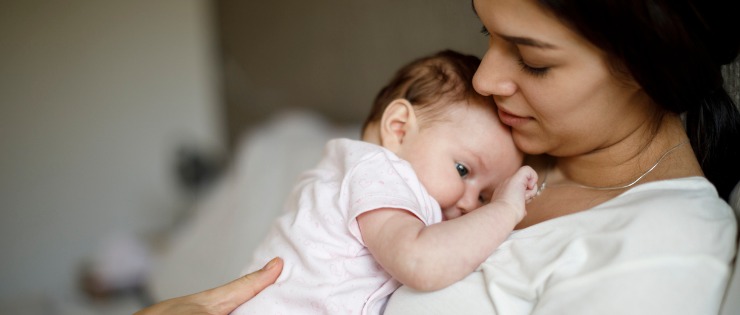
Chances are you’ve heard about postnatal depression, but what’s postnatal anxiety (PNA)? Having a new baby in your life comes with many emotions. One of those is anxiety, which is understandable. New parents have to work out if their baby is hungry, tired, getting enough sleep, needs changing or unwell. It’s enough to make anyone feel a little anxious!
What is Postnatal Anxiety?
Postnatal anxiety can appear soon after birth or appear gradually, weeks or months later. Symptoms can be mild, moderate or severe, depending on the number of symptoms and how they affect your daily life. New mums and dads can suffer from postnatal anxiety.
Symptoms of Postnatal Anxiety
It’s normal to feel anxious after the birth of a new baby. Babies don’t arrive with an instruction book, so you have to work out feeding and sleep routines through trial and error. But some parents suffer from more than a little anxiety.
There’s a range of mental and physical symptoms connected to postnatal anxiety. Familiarise yourself with the symptoms so you can look out for them in yourself and your partner. The mental symptoms include:
Persistent worrying
Panic attacks
Mood swings
Always feeling tired and lacking energy
Lack of interest in activities that would have previously brought joy
Withdrawing from friends and family social groups
Feelings of anger
Struggling to focus or concentrate
Experiencing thoughts about harming your baby
Experiencing thoughts about suicide
Crying for no reason
Obsessive or compulsive thoughts
Feeling on edge and panicky
Physical symptoms can include:
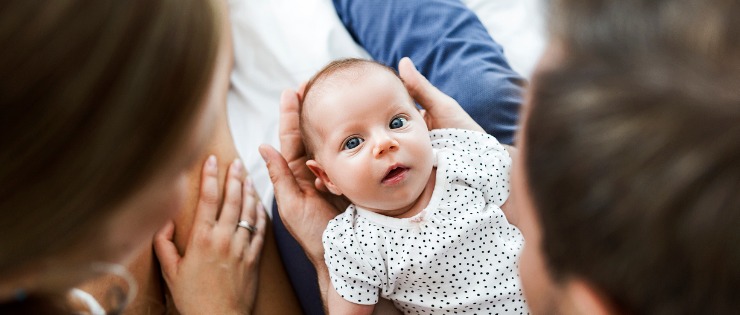
Who Is Affected by Postnatal Anxiety?
Anxiety is the most common mental health problem with one in four people affected in their life. Some new mums will experience anxiety for the first time after their baby arrives, while others may have had anxiety for years before bub’s arrival.
People often assume that any postnatal condition only refers to mothers, but fathers are also at risk of postnatal anxiety. While it’s normal for dads to feel a little scared about the leap into parenthood, it could be postnatal anxiety if it affects their daily activities.
Difference Between Postnatal Depression and Postnatal Anxiety
There are similarities and differences between postnatal depression and anxiety. Both conditions have similar physical symptoms, but women with postnatal depression often feel extremely sad and may have thoughts of harming themselves or their baby.
Around 16% (one in seven) women suffer postpartum depression in the year after the birth of their baby. It’s common for new mums to experience both postnatal depression and anxiety. Around 5% of new dads suffer from postnatal depression.
The ‘baby blues’ is a much shorter condition with a duration of one to two weeks. Up to 70% of new mums suffer the symptoms of crying for no reason, being irritable, anxious or restless. The blues start in the postpartum period (the first six weeks after birth) and usually resolve itself with no treatment. It’s thought to result from changes in hormones following birth.
Causes of Postnatal Anxiety
While they have undertaken research into the condition, doctors don’t have all the answers. Why some women don’t experience perinatal anxiety (the period between conception and baby’s first birthday) while others experience crippling anxiety is unknown. However, doctors have been able to identify some factors that make some women more likely to suffer postnatal anxiety.
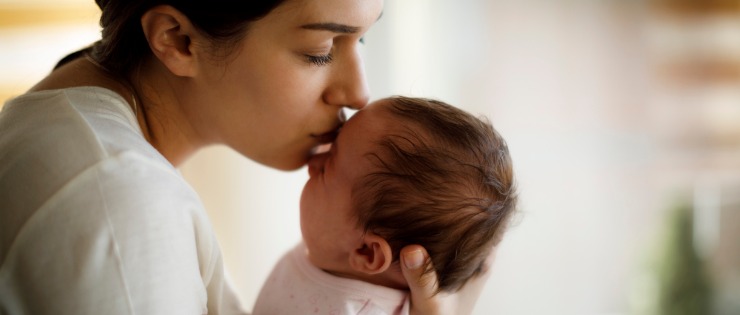
History of Anxiety or Mental Illness
People who have suffered from anxiety before pregnancy or have family history are at greater risk of suffering anxiety after the birth. Episodes of depression, an eating disorder or obsessive-compulsive disorder before pregnancy can also raise the risk of suffering anxiety after the birth.
Mood Swings
Researchers have found a link between women who suffered from mood swings during their periods and postpartum anxiety as new mothers.
Difficult Pregnancy/Pregnancy Loss or Stillbirth
Some women suffer difficult or complicated pregnancies for a variety of reasons. Fertility problems, severe morning sickness, increased monitoring, bed rest, a past miscarriage or stillbirth can all increase the risk of developing postnatal anxiety.
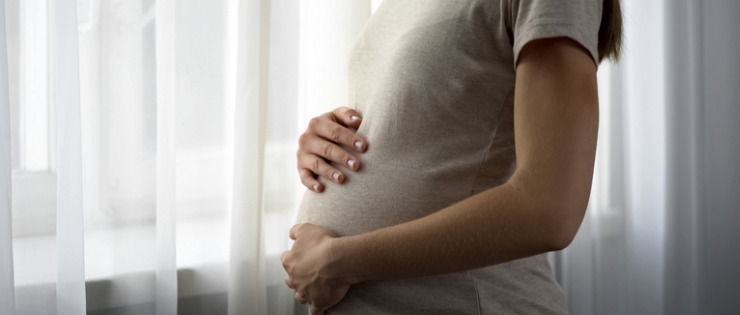
Poor Birth Experience
It’s not uncommon for new mothers to feel disappointed with their birth experience. They may have wanted a natural birth but required an emergency C-section or experienced trauma and pain during the birth that they hadn’t expected. The disappointment and regret can sometimes lead to postnatal anxiety. Dads can also suffer from a stressful birthing experience with feelings of helplessness that may contribute to their postnatal anxiety later on.
Finances
Money worries can increase the stress during pregnancy and anxiety after the birth for new mothers and fathers. The increased expenses of a new baby come when there’s less income coming in, causing stress and worry.
Abuse
When a new bub is on the way, it can trigger old memories for the expectant mum or dad. Survivors of emotional, physical or sexual abuse are at increased risk of anxiety. Physical, financial, and emotional abuse during pregnancy can also cause postnatal anxiety.
Treatment for Postnatal Anxiety
There are many different treatments for postnatal anxiety. New parents may try one or a combination of methods until they find the right one that works for them.
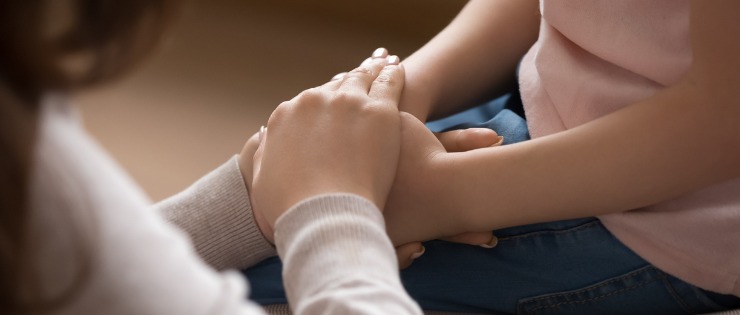
Professional Help
Most new mothers have a check-up with their obstetrician or GP six weeks after giving birth. Doctors are trained to look for signs of postnatal anxiety and depression and ask questions to identify a problem. But if you think you’re suffering from either, tell your doctor. It’s important that you take care of yourself, so you can care for your family. Getting treatment can improve your quality of life and your parenting experience. Postpartum anxiety and depression can also affect the bond between parent and bub.
Seeking help for anxiety and depression is important because symptoms can worsen if left untreated. Tell your doctor how you’re feeling.
There are many treatment types for postnatal anxiety or depression. You may receive a script for medication, try supplements, see a mental health specialist or complementary therapy such as acupuncture.
Keep Seeking Help
If you don’t feel the recommended treatment has worked, don’t be afraid to go back to your doctor and ask to try something else. Postnatal anxiety is slightly different for everyone, and there is no single magic cure. It can take trial and error to find the treatment method that’s right for you.
Self Help
It's beneficial to combine professional treatment with activities that can lift your mood and help you feel more in control. While it’s hard to find the time as a new parent, try to do some exercise or relaxation techniques. Try mindfulness meditation, focused breathing, yoga, tai chi or repetitive prayer.
Exercise releases the feel good hormone serotonin. Many new mums feel happier and healthier when they exercise after the birth.

Ask for a Hand
Most people recognise the first weeks and months after birth are very difficult. The lack of sleep and feeding the baby around the clock takes its toll on almost every mother in the first 12 months. If you’re feeling tired or anxious, call on a friend or family member to watch the baby while you rest or help you with the household chores. Nutrition is important while you recover from the birth and if you’re breastfeeding so ask someone to cook you a meal if you find it hard to cook and care for the baby.
Join a Support Network
Many mums will tell you how important a support network was to them during the early months and years of their child’s life. They joined a mothers’ group, playgroup, or school mum’s group and felt reassured when they spoke to other mums who were experiencing the same struggles as them. A link to other women who at the same life stage can be invaluable.
Give Yourself a Break
There’s no such thing as a supermum. Don’t look to social media and compare yourself to other new mums. It’s quite likely they have laundry and dishes piling up just out of frame in the photos. Be proud of the job you’re doing, it’s the hardest job in the world.